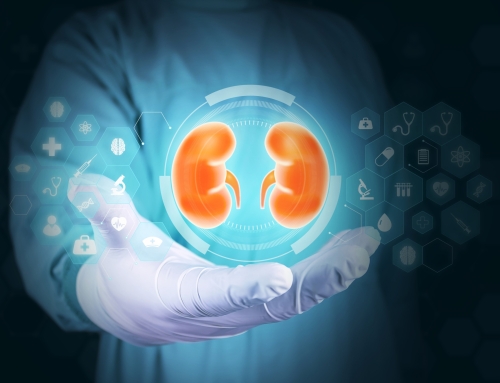If you receive dialysis treatments for kidney disease, you probably spend a lot of time focused on your physical health. That’s important — but so, too, is your mental and emotional well-being.
Dialysis is life-saving, but it’s also life-changing. Still, by taking charge of your emotional health — and accepting help when you need it — you can live a rewarding life on dialysis.
Rollercoaster Emotions
Dialysis requires significant time and effort. In addition to the considerable time spent traveling to and from appointments and receiving treatment itself, people receiving dialysis must carefully monitor their diet and fluid intake. It’s a lot of work, and it takes time to adapt to the changes.
When people learn they need to begin dialysis, they typically experience a flurry of emotions. Often, the first reaction is shock or denial. People may feel numb or fail to accept the reality of the situation. Anger, sadness, worry, and guilt are also common. People may dwell on the past, wondering what they could have done differently.
When people learn they need to begin dialysis, they typically experience a flurry of emotions.
But the emotions aren’t always negative. People who knew that dialysis was likely in their future might feel a kind of relief now that they have started. Some people, such as those awaiting a kidney transplant, might feel a strange mixture of emotions, including hopefulness, anxiety and fear.
No matter what you’re feeling, it helps to know this emotional rollercoaster is common. As you adjust to the dialysis routine, you should start to feel more like yourself again. And as you continue on with your life, there are steps you can take to manage sadness, worry and stress.
Managing Stress and Negative Feelings
Maintain the activities in life that bring you pleasure. Don’t let dialysis prevent you from doing things you love to do. As much as possible, keep up the hobbies and interests you had before dialysis, even if you have to adapt them somewhat to your dialysis schedule or health condition. If you can, continue working. Socialize with friends. People who make a point to go on with life as usual, despite dialysis, tend to be happier and healthier.
Educate yourself. Gather information and ask questions to help you understand the dialysis treatment and the lifestyle changes that go along with it. Your healthcare providers are learning from you, too. Keep a list of your questions and bring them to your doctor appointments and keep a notebook of important information so you have all your medical information in one place. Having all the necessary details will help you maintain a sense of control over your health.
Stay connected to other people. Reach out for support from your spouse/partner, family and friends. Be open with them about what you’re experiencing and how you’re feeling, and don’t be afraid to ask for help. Explain to others what you need; your loved ones probably want to help, but they may not know how unless you tell them.
Seek additional support. No matter how helpful your friends and family are, it can be hard for you to experience something they don’t fully understand. Talk to your doctor about joining a support group for people with kidney disease so you can connect with others who are going through the same things you are.
Take a deep breath. Relaxation exercises such as meditation and gentle forms of yoga, as well as prayer can help lower stress levels. Exercise has also been shown to boost mood in people undergoing dialysis. Consult with your physician about what forms of exercise are safe and appropriate for you.
Give back. Continuing to be helpful to those you love, volunteering your time or doing charitable work can help remind you that you have valuable skills to offer, even if you can no longer work or take on as many commitments as you once did.
Seek professional help. When dealing with a chronic illness, it’s easy to get stuck in negative thought patterns. Psychologists, social workers and other mental health professionals can help you take control of those negative thoughts and adjust to the unique challenges of dialysis.
Signs You May Need Help
It’s normal to feel sad while adjusting to the changes that dialysis brings. But for some people, the sadness lingers. Studies suggest that approximately 1 in 5 patients with chronic kidney disease suffer from depression. Anxiety is also common in people with chronic illness. A 2008 study found that 45 percent of people receiving dialysis for end-stage renal disease experienced some type of anxiety disorder.
You might need extra help managing your emotions if you notice you are:
- Feeling hopeless
- Often very stressed or worried
- Sleeping more or less than you used to
- Frequently irritable with friends and family
- Withdrawing from people or activities you used to enjoy
- Doing things you know aren’t healthy, like skipping medications
- Making excuses for not following doctor’s recommendations
If you’re concerned about your emotional state or your stress levels, there are people who can help. The doctors and mental health professionals at your dialysis clinic are trained to discuss these concerns with you and help you manage them. They can also provide you with resources and referrals to local mental health providers in your community that can help.
People undergoing dialysis can safely take some antidepressant medications. However, non-drug options may also be effective, either alone or in combination with medications. Studies have found that exercise therapy and cognitive behavioral therapy (CBT), for instance, can successfully treat depression in people with chronic kidney disease. With CBT, a mental health professional can help you identify ways that you are stuck and help you gain control over negative thoughts and unhelpful behaviors. Many people with kidney disease find that therapy can help them begin to feel like their old selves again.
Moving Forward
Establishing new, healthy habits takes time. When you make a mistake, don’t beat yourself up — or give up. Instead of dwelling on what you did wrong, think about how you might better handle that situation in the future, and then move on.
Chronic kidney disease is serious, but it is manageable. With the right tools and the right support, you can take control of your emotional and physical health to live a full and rewarding life.



